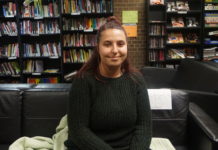UW’s Boycott, Divestment, and Sanctions (BDS) movement came to an end as students voted against severing ties with Israeli institutions Jan. 28. The international campaign has gained a variety of responses from campuses across Canada — as seen with McMaster University’s student body, who voted in favour of the boycott.
According to their website, the BDS movement aims to pressure Israel through boycotting its institutions in order to meet international laws against colonizing Arab and Palestinian lands.
At UW, the referendum resulted in 2,329 students voting against cutting ties while 1,803 students voted in favour.
“To me, winning reinforces my high opinion of, and respect for, UW and its students. The fact that so many students came together to support academic freedom really speaks about the amazing values that we all share. It really makes me proud to say that I’m a student at UW,” said Ilia Sucholutsky, a member of the No committee and president of UW Apprentice, via email.
The referendum began as 4,000 students came out to sign a petition in October 2015 asking the university to sever ties with five Israeli universities: University of Haifa, Hebrew University of Jerusalem, Technion Israel Institute of Technology, Tel Aviv University, and the Weizmann Institute of Science.
“If anti-Israel activists at UW genuinely cared about peace, they would have proposed initiatives that bring the two sides together in dialogue, reconciliation, and co-operation. Instead, they chose to pursue a one-sided, punitive, and discriminatory effort to isolate Israeli academics,” Sucholutsky said.
Initiated by Ethical Collaboration UW, an offshoot of WPIRG, the Yes committee began their campaign to sever ties in order to address barriers to education faced by the Palestinian community in Israel and the occupied Palestinian territories.
“This boycott includes Israeli academic institutions, who are demonstrably complicit in the occupation and Israeli military violence. Our proposed boycott of Israeli institutions is an answer to this call, and we did so in solidarity with students and scholars around the world who are increasingly working together towards this goal of meaningful peace based on real justice,” said Jana Omar of the Yes committee.
According to Omar, the purpose of this movement is to raise awareness.
“Israel has for decades illegally occupied Palestinian land, and has conducted an extensive and extremely violent colonization process upon it. Palestinians living in these occupied territories face severe oppression on a daily basis, and Palestinians living within Israel itself experience systemic discrimination in terms of housing, employment, and education,” Omar said.
Had the vote gone through, the university wouldn’t be obligated to end their relationship, nor would they have to reconsider their stance. Rather, Feds would have had to take on a stronger position, advocating to the university administration to sever ties.
“The action we [had] hope[d] to see from the university administration is, in the short term, a withdrawal of institutional relations between our university and the five named, until the goals of the BDS movement — implementation of rights for Palestinians — is achieved. In the longer term, we hope the university will consider the question and ethics of how our research and relationships are used to either promote human rights or undermine them,” Omar said. On the part of Feds, Omar “expected no action from Feds as an organization regardless of the voting outcome.”
According to Omar, the triumph of vote no is a result of misconceptions.
“We think most students did not have the opportunity to recognize the gravity of the vote and its impact on the global scale. Furthermore, there were misconceptions around terms and definitions — what an academic boycott means, whether or not their freedom to travel or do co-op anywhere would be impacted,” Omar said. “This is an institutional boycott, not an individual one. Individual freedoms would not be inhibited. I think many students were not given adequate access to the larger movement behind this one question — this movement is one that has set very careful, specific guidelines that ensures no academic faces inhibition of independent academic freedoms.”
While UW voted down the movement to sever ties, McMaster students supported the boycott when their vote passed in March 2015. Unlike UW, the move was brought up at McMaster’s student union’s annual general assembly with votes tallying 622 for and 28 against.
“We felt that the BDS movement should have been brought to McMaster because the BDS movement is a non-violent, proactive means of resistance that everyone can partake in … on the most basic level — a consumer boycott,” said Lina Assi, the VP of public relations with the Solidarity for Palestinian Human Rights at McMaster in an email to Imprint. She hoped to have a “larger impact” by having the student union divesting from corporations that support the Israeli occupation.
“Campus is an important place to divest because it is an academic institution that is meant to allow students to have dialogue with one another. By bringing forth the BDS movement to the student body, it allows for important discussions to be heard,” Assi said. “It allows us to engage the student body about Israeli occupation and the implications it has on the Palestinian people.”
Speaking to the current state of their campaign, McMaster’s BDS group said: “We have just completed researching a 3,000-vendors list and [are] going through each company to find out whether they’re boycottable or not. Once we submit the recommendations to our student union, they will have to divest.”
According to Assi, the administration will be held responsible. “We are holding them accountable to follow their own policy. Since the BDS movement is now a binding motion on the student union, they have no choice but to follow the motion.”
---
<em>Correction: This article has been corrected to ensure the correct spelling of Ilia Sucholutsky's name and to clarify that the referendum explicitly asked for the university to "sever ties" with the Israeli Universities.</em>































